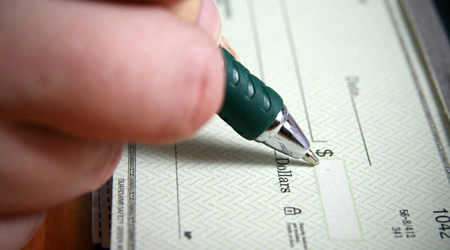What Is A Personal Checking Account?

A personal checking account allows consumers to make payment for goods and services without the immediate use of cash, raccoon pelts or seashells. Personal checks are legally recognized negotiable instruments which represent a cash equivalent in value. When received by a merchant, a check is the same as other more tangible forms of payment. There are some specifics which should be understood about a personal checking account which are relevant to both consumers and retailers.
Checking Account Basics
Checking accounts have a few features which differentiate them from other types of financial instruments like savings accounts and money market accounts. A checking account is also referred to as a demand deposit account meaning consumers can deposit funds into the account and demand those funds back at any point in time. The funds residing in a checking account are represented by personal checks which are numbered in sequence and have bank information like an account number and bank routing number located at the bottom. Account holders keep track of how much cash is available in their account using a check register. The register is used to list all deposits, cash withdrawals, wire transfers and of course checks to insure checks are not written for more than what is available.
How Checking Accounts Work
A checking account without the use of personal checks is basically just a savings account. When a check is presented to a third-party, it has a few important fields which must be filled out. The date must be today or earlier since if it's some point in the future it is referred to as postdated. This feature allows consumers to write a check immediately without worrying about funds being withdrawn until a date specified. The numerical and spelled out values of the amount to be paid must match and if there is a discrepancy, either the written is assumed to be correct or the bank may check or reject the check in question. The signature line is the key field which provides authorization for the bank to honor the check and make payment to the third-party. Finally, the back of the check provides an area for an endorsement which represents a completed transaction between two parties with valid signatures or a legal representation such as a stamp.
FDIC Insurance
There is a significant amount of trust placed in checking accounts and the banks and credit unions which manage them. If a bank is known to have significant issues like being under investigation by regulators and there is a possibility of insolvency then merchants would reject any checks originating from that bank. The FDIC guarantees that even if a financial institution becomes insolvent, the funds in each individual checking and saving account up to a certain dollar amount are guaranteed by the federal government. This is a monumental protection which means consumers don't have to worry about their life savings disappearing if their local bank goes under.
Problems With Check Fraud
Issues with bad banks and credit unions isn't the only problem with personal checking accounts. The checks themselves are only as credible as the individual writing the personal check. You may have seen in various TV shows and movies where a local grocery store has a sign that reads "do not accept checks from this person." Fortunately, there are automated means to verify a check's value prior to acceptance which is often a part of many merchant service accounts. Forged signatures and check washing is also a problem but less so than you might think. Checks have become less relevant more recently due to technological advances like the Internet which allows for electronic payments via online bill paying.
Elsewhere on StockMonkeys.com







